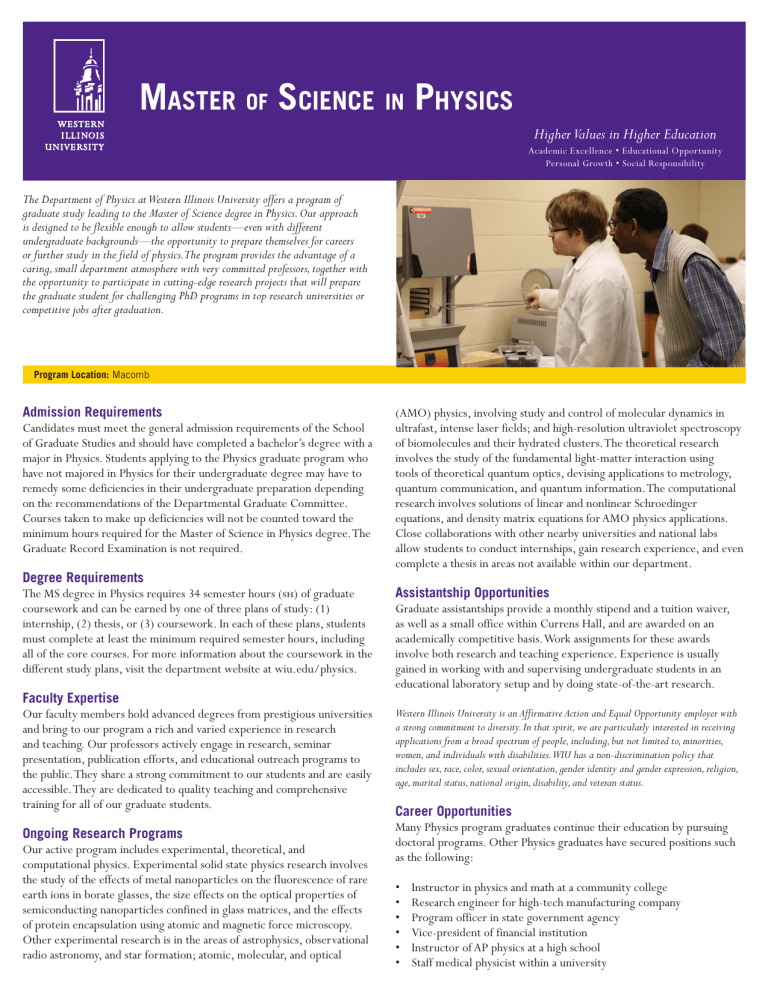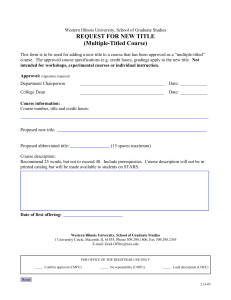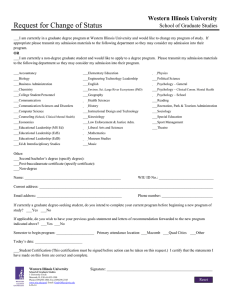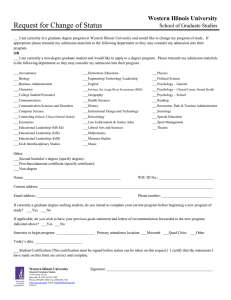M s P

M
aster
of
s
cience
in
P
hysics
Higher Values in Higher Education
Academic Excellence • Educational Opportunity
Personal Growth • Social Responsibility
The Department of Physics at Western Illinois University offers a program of graduate study leading to the Master of Science degree in Physics. Our approach is designed to be flexible enough to allow students—even with different undergraduate backgrounds—the opportunity to prepare themselves for careers or further study in the field of physics. The program provides the advantage of a caring, small department atmosphere with very committed professors, together with the opportunity to participate in cutting-edge research projects that will prepare the graduate student for challenging PhD programs in top research universities or competitive jobs after graduation.
Program Location: Macomb
Admission Requirements
Candidates must meet the general admission requirements of the School of Graduate Studies and should have completed a bachelor’s degree with a major in Physics. Students applying to the Physics graduate program who have not majored in Physics for their undergraduate degree may have to remedy some deficiencies in their undergraduate preparation depending on the recommendations of the Departmental Graduate Committee.
Courses taken to make up deficiencies will not be counted toward the minimum hours required for the Master of Science in Physics degree. The
Graduate Record Examination is not required.
Degree Requirements
The MS degree in Physics requires 34 semester hours ( sh ) of graduate coursework and can be earned by one of three plans of study: (1) internship, (2) thesis, or (3) coursework. In each of these plans, students must complete at least the minimum required semester hours, including all of the core courses. For more information about the coursework in the different study plans, visit the department website at wiu.edu/physics.
Faculty Expertise
Our faculty members hold advanced degrees from prestigious universities and bring to our program a rich and varied experience in research and teaching. Our professors actively engage in research, seminar presentation, publication efforts, and educational outreach programs to the public. They share a strong commitment to our students and are easily accessible. They are dedicated to quality teaching and comprehensive training for all of our graduate students.
Ongoing Research Programs
Our active program includes experimental, theoretical, and computational physics. Experimental solid state physics research involves the study of the effects of metal nanoparticles on the fluorescence of rare earth ions in borate glasses, the size effects on the optical properties of semiconducting nanoparticles confined in glass matrices, and the effects of protein encapsulation using atomic and magnetic force microscopy.
Other experimental research is in the areas of astrophysics, observational radio astronomy, and star formation; atomic, molecular, and optical
(AMO) physics, involving study and control of molecular dynamics in ultrafast, intense laser fields; and high-resolution ultraviolet spectroscopy of biomolecules and their hydrated clusters. The theoretical research involves the study of the fundamental light-matter interaction using tools of theoretical quantum optics, devising applications to metrology, quantum communication, and quantum information. The computational research involves solutions of linear and nonlinear Schroedinger equations, and density matrix equations for AMO physics applications.
Close collaborations with other nearby universities and national labs allow students to conduct internships, gain research experience, and even complete a thesis in areas not available within our department.
Assistantship Opportunities
Graduate assistantships provide a monthly stipend and a tuition waiver, as well as a small office within Currens Hall, and are awarded on an academically competitive basis. Work assignments for these awards involve both research and teaching experience. Experience is usually gained in working with and supervising undergraduate students in an educational laboratory setup and by doing state-of-the-art research.
Western Illinois University is an Affirmative Action and Equal Opportunity employer with a strong commitment to diversity. In that spirit, we are particularly interested in receiving applications from a broad spectrum of people, including, but not limited to, minorities, women, and individuals with disabilities. WIU has a non-discrimination policy that includes sex, race, color, sexual orientation, gender identity and gender expression, religion, age, marital status, national origin, disability, and veteran status.
Career Opportunities
Many Physics program graduates continue their education by pursuing doctoral programs. Other Physics graduates have secured positions such as the following:
• Instructor in physics and math at a community college
• Research engineer for high-tech manufacturing company
• Program officer in state government agency
• Vice-president of financial institution
• Instructor of AP physics at a high school
• Staff medical physicist within a university
“I cannot think of any other place that would have prepared me better for my doctoral studies than the
Physics department at WIU. The quality education I received and the helpful faculty whose goal was to see that I succeeded at Western Illinois University and beyond was more than I anticipated.”
– Godfrey Walwema, MS, May 2013
PhD student, University of Wyoming
WIU.EDU/PHYSICS
Contact Information
For admissions process and general program information, contact the
School of Graduate Studies, Western Illinois University, 1 University
Circle, Macomb, IL 61455, (309) 298-1806, (877) WIU GRAD toll-free,
Grad-Office@wiu.edu, wiu.edu/grad.
For specific program questions, contact the Department of Physics,
Western Illinois University, 1 University Circle, Macomb, IL 61455,
(309) 298-1596, physics@wiu.edu, wiu.edu/physics.
• Lab associate in a university biophysics laboratory
• Nuclear engineer within a university research department
Alumni Thoughts
The mathematical methods I learned in my Physics courses at Western and the experimental techniques in optics and solid state physics are something I use almost every day in my position here. Having worked in a closely interactive environment with the faculty there helps me even yet in my collaboration with other senior personnel at my institute. The computer skills I learned in the department’s computer and microcomputer applications courses helped me land this interview and a very rewarding salary.
– James J. Murray, Oceanography Programmer Analyst
The faculty and staff of the Physics department were not only interested in our academics but were also actively interested in our physical and financial wellbeing. This was backed up by financial aid and scholarship opportunities for most students. The diversity of the student population within the department also further helped my understanding of the way the world works.
–Akinloluwa Olumoroti
Sprint Communications


